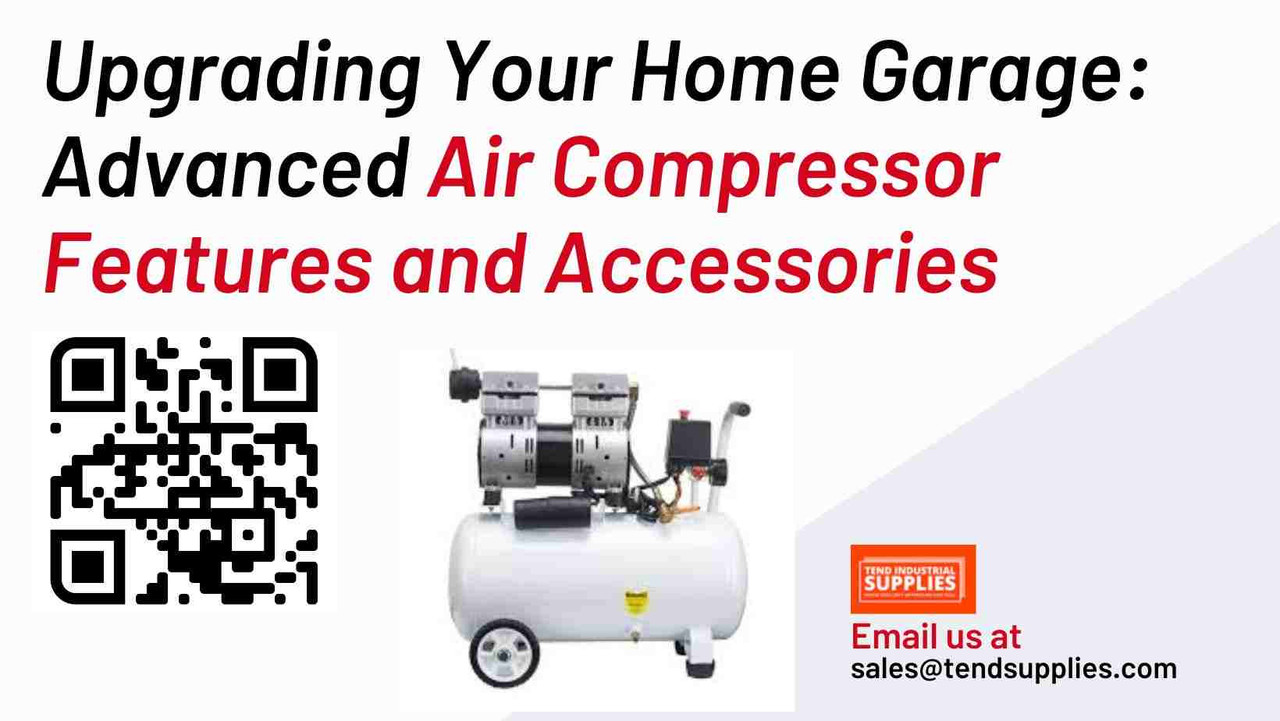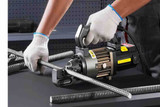Upgrading Your Home Garage: Advanced Air Compressor Features and Accessories
If you're a DIY enthusiast or home mechanic looking to take your garage workshop to the next level, investing in ahigh-quality air compressor with advanced features and accessories can make a world of difference. AtTend Industrial Supplies, we pride ourselves on offering top-of-the-line air compressors and accessories to help you tackle any project with ease and efficiency. In this article, we'll explore some of the most advanced air compressor features and must-have accessories to upgrade your home garage setup.
Advanced Air Compressor Features
1. Variable Speed Drive (VSD)
Traditional air compressors operate at a fixed speed, which can lead to energy waste and increased wear and tear on the machine. Upgrading to an air compressor with a Variable Speed Drive (VSD) allows the motor to adjust its speed based on the demand for compressed air. This not only saves energy and reduces your electricity bills but also extends the life of your air compressor by minimizing unnecessary strain on the motor.
2. Oil-Free Design
While oil-lubricated air compressors have been the norm for decades, modernoil-free air compressors are gaining popularity due to their low maintenance requirements and cleaner air output. Oil-free air compressors use permanently lubricated bearings and piston rings, eliminating the need for regular oil changes and the risk of oil contamination in the compressed air. This makes them ideal for applications where clean, oil-free air is essential, such as painting, food processing, and electronics manufacturing.
3. Quiet Operation
If you're using your air compressor in a residential area or simply value a peaceful working environment, consider investing in a model designed for quiet operation. Many modern air compressors feature advanced sound-dampening technology, such as insulated cabinets, low-noise air intakes, and vibration-reducing mounts. These features can significantly reduce the noise level of your air compressor, allowing you to work comfortably without disturbing your neighbors or family members.
4. Smart Controls and Connectivity
Some high-end air compressors now come equipped with smart controls and connectivity features, allowing you to monitor and control your machine remotely using a smartphone app or web interface. These advanced features enable you to track performance metrics, set maintenance reminders, and even adjust settings on-the-go. By staying connected to your air compressor, you can optimize its performance, anticipate maintenance needs, and minimize downtime.
Must-Have Air Compressor Accessories
1. Air Filters and Regulators
To ensure your air compressor delivers clean, dry, and precisely regulated air to your tools and equipment, invest in high-quality air filters and regulators. Air filters remove contaminants like dust, moisture, and oil from the compressed air, protecting your tools and ensuring a better finish on your projects. Regulators allow you to adjust the air pressure delivered to your tools, preventing damage from over-pressurization and optimizing performance.
2. Automatic Drain Valves
Condensation can build up in your air compressor's tank over time, leading to corrosion and reducing the tank's storage capacity. Installing an automatic drain valve helps to remove this condensate regularly without manual intervention. These valves open automatically when the air compressor shuts off or at timed intervals, ensuring your tank stays free of water and prolonging its lifespan.
3. Hose Reels and Fittings
Keeping your workspace organized and tidy is crucial for safety and efficiency. Investing inhose reels allows you to neatly store your air hoses when not in use, preventing tripping hazards and extending the life of your hoses by protecting them from damage. Additionally, stocking up on a variety of hose fittings and quick-connect couplings makes it easy to switch between tools and attachments without wasting time on threading and unthreading hoses.
4. Air Tool Lubricants and Accessories
To keep yourair tools running smoothly and extend their lifespan, regularly use recommended air tool lubricants and replace worn-out accessories like chisels, blades, and sanding pads. High-quality lubricants protect against rust, reduce friction and wear on moving parts, and prevent contamination of your air supply. Keeping a stock of commonly used tool accessories on hand ensures that you can tackle any project without delays caused by worn or damaged parts.
5. Portable Air Tanks
For jobs that require compressed air away from your main air compressor, consider investing in a portable air tank. These tanks can be filled from your main compressor and transported to remote work sites or areas of your garage that aren't easily reached by your air hose. Portable air tanks come in various sizes and are equipped with pressure gauges, regulators, and quick-connect fittings for easy use with your air tools.
Related Articles
Air Up Your DIY Projects: The Ultimate Guide to Portable Air Compressors for Your Home Garage (Fast Shipping & Easy Returns on Amazon!)
2024's Leading Air Compressors
Ultimate Guide to Choosing the Best Air Compressor for Your Home Garage in 2024
FAQs
1. What size air compressor do I need for my home garage?
The size of the air compressor you need depends on the air tools you plan to use and the frequency of use. For most home garage applications, a20-30 gallon air compressor with a 5-6 HP motor should suffice. However, if you frequently use air-hungry tools like sanders, grinders, or paint sprayers, you may want to consider a larger 60-80 gallon compressor with a 7-10 HP motor.
2. Are oil-free air compressors better than oil-lubricated compressors?
Oil-free air compressors have several advantages over oil-lubricated compressors, including lower maintenance, cleaner air output, and lighter weight. However, oil-lubricated compressors generally have a longer lifespan and are better suited for heavy-duty, continuous use applications. The best choice for you depends on your specific needs and preferences.
3. How often should I drain my air compressor tank?
It's recommended todrain your air compressor tank after every use to remove any accumulated moisture and prevent corrosion. If you have an automatic drain valve installed, it will handle this task for you. However, it's still a good idea to manually check your tank for moisture periodically and drain as needed.
4. Can I use my air compressor to power air tools that have different PSI requirements?
Yes, you can use a regulator to adjust the air pressure delivered to your tools, ensuring that each tool receives the proper PSI for optimal performance and safety. Be sure to consult your tool manuals for the recommended PSI range and never exceed the maximum rated pressure.
5. How can I extend the life of my air compressor?
To extend the life of your air compressor, follow these best practices:
- Perform regular maintenance, including oil changes (if applicable), filter replacements, and belt inspections
- Drain your tank regularly to prevent moisture buildup and corrosion
- Store your compressor in a cool, dry place to prevent rust and deterioration
- Use a properly sized extension cord and avoid overloading electrical circuits
- Operate your compressor within its rated capacity and avoid running it continuously for extended periods.
By investing in advanced features, must-have accessories, and proper maintenance, you can create a top-performing compressed air system that will serve you well for years to come. Ready to upgrade your home garage? ContactTend Industrial Supplies today at sales@tendsupplies.com or visit tendsupplies.com to explore our wide selection of high-qualityair compressors and accessories. Our knowledgeable staff is ready to help you find the perfect solution for your needs and budget.









